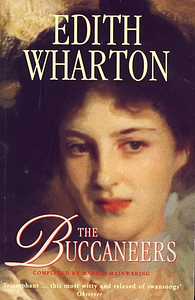Take a photo of a barcode or cover
Quite a good read. This edition was completed by an Edith Wharton scholar (based on Mrs. Wharton's notes).
challenging
emotional
funny
lighthearted
medium-paced
challenging
emotional
reflective
sad
slow-paced
Plot or Character Driven:
Character
Strong character development:
Yes
Loveable characters:
Yes
Diverse cast of characters:
No
Flaws of characters a main focus:
No
It's been a while since I read any Wharton, but her writing was more straightforward and simple than I remember. I was looking for some nice 19th century social drama, and I certainly found it in The Buccaneers, but I was disappointed in the lack of angst and psychological drama that I'd expect from Wharton. There were some odd plot jumps that I was also sad about, as the reader misses most of the significant plot point.
And as other reviewers have mentioned, I didn't appreciate the alternate happy ending provided by the 20th century author. Where's the inner drama?! Where's the angst?!
And as other reviewers have mentioned, I didn't appreciate the alternate happy ending provided by the 20th century author. Where's the inner drama?! Where's the angst?!
Brilliant, and much less depressing than many of Wharton's books. That may be because she didn't finish this manuscript, and the contemporary author who does (Marion Mainwaring) manages to get a happy ending in for at least a couple of the characters, although not all. This may not be Wharton-like (I usually feel like overdosing on laudanum when I finish one of her books), but I don't care. The writing is seamless--I absolutely could not tell the difference between the original Wharton and the final chapters written by Mainwaring--and the book as a whole is brilliant. Four young American girls, the buccaneers, who can't quite scramble up to the highest level of New York Society in the 1870s, sail to London and take England by storm. Very biting commentary on all sorts of levels, but also very fun.
Having been badly scarred by the abrupt lack-of-conclusion in Gaskell's Wives and Daughters, I knew I needed to read the version of The Buccaneers with an added ending. I was familiar with the story, having seen the BBC/WGBH miniseries, and looked forward to reading it.
Wharton's style is much lighter than her other works, but with serious issues at stake. In these stories, marriage is not the happy ending on the last page - it is only the beginning. She follows several wealthy young American women who move to England in the hopes of marrying titled gentlemen, whose financial circumstances put them in need of "new money." This did happen in real life, and some of the stories imitate those of historical figures, with Conchita Closson standing in for Consuela Vanderbilt. The characters may live in a strict social world, but the rules are only followed on the surface. Culture clash between America and Europe is inevitable, and there are also schemes, betrayals, affairs, rivalries, and ambitions for power.
The characters do not develop a great deal, though we mostly see insights into Nan and her governess, Miss Testvalley. Nan St. George is a dreamer and romantic, trying to reconcile her childish imagination to the responsibilities and disappointments of adult life in a confining society. Miss Testvalley is practical, yet proud of her poetic lineage (being a favorite relative of Dante Gabriel Rossetti) and determined to see Nan happy. Nan's first meeting with the Duke of Tintagel is in some romantic ruins in Cornwall - a scene which (understandably) overwhelms them both in sentiment and leads to their marriage, though the ruins are clearly more symbolic of their compatibility. Nan is unprepared for the social hierarchies and duties of an English Duchess, and the Duke's cold personality (and devotion to his mother) push her away.
The last few chapters felt a bit over sentimental and, for lack of a better word, "modern" in tone. Otherwise, the added chapters feel close enough to Wharton's style to avoid becoming a distraction. If you enjoy 19th century dramas, and enjoy some soap opera style relationships, I would highly recommend The Buccaneers.
Wharton's style is much lighter than her other works, but with serious issues at stake. In these stories, marriage is not the happy ending on the last page - it is only the beginning. She follows several wealthy young American women who move to England in the hopes of marrying titled gentlemen, whose financial circumstances put them in need of "new money." This did happen in real life, and some of the stories imitate those of historical figures, with Conchita Closson standing in for Consuela Vanderbilt. The characters may live in a strict social world, but the rules are only followed on the surface. Culture clash between America and Europe is inevitable, and there are also schemes, betrayals, affairs, rivalries, and ambitions for power.
The characters do not develop a great deal, though we mostly see insights into Nan and her governess, Miss Testvalley. Nan St. George is a dreamer and romantic, trying to reconcile her childish imagination to the responsibilities and disappointments of adult life in a confining society. Miss Testvalley is practical, yet proud of her poetic lineage (being a favorite relative of Dante Gabriel Rossetti) and determined to see Nan happy. Nan's first meeting with the Duke of Tintagel is in some romantic ruins in Cornwall - a scene which (understandably) overwhelms them both in sentiment and leads to their marriage, though the ruins are clearly more symbolic of their compatibility. Nan is unprepared for the social hierarchies and duties of an English Duchess, and the Duke's cold personality (and devotion to his mother) push her away.
The last few chapters felt a bit over sentimental and, for lack of a better word, "modern" in tone. Otherwise, the added chapters feel close enough to Wharton's style to avoid becoming a distraction. If you enjoy 19th century dramas, and enjoy some soap opera style relationships, I would highly recommend The Buccaneers.
I didn't know that this book was unfinished when I started it, although unlike some unfinished books, it ends in a decent spot. The story was amusing for the most part, although it did drag in places. Overall, an entertaining read.
Good clean fun. Upstanding New York girls whose fathers have money wish to marry into titles and respectability in London society. Or rather, their mothers would like them too. Some cutthroat competition for a young duke. Plus several plain English girls will have none of it. Wharton at her very best.
A hybrid from 2 decades and 2 authors which is interesting and I admire the work behind it. It was very engaging early on and degenerated into a simple and not very satisfying romance toward the end. By far the most interesting character was Miss Testvalley who I realise was meant as a supporting-character all along but I still felt the ending did not do her justice.
After so much critical insight into classism, sexism (this is not explored and perhaps not acknowledged by the author but is a theme) and various levels of cliquey "popular" cultures (one as bad as the other though there are 3 or 4 that intersect in the book) the last thing I care about is who Nan "ends up with". I am not saying don't give her a happy ending I am saying she needs something more substantive than she got. It may not help that I didn't really click with any of the characters in the first place, they are not really relatable and as such the satire/critique should have been kept sharper. A good example of this is the softening of the gaze on Nan and Ginny's father who is a boorish entrepreneur/capitalist at the beginning and "dear old dad" by the end. I can't see clearly where the stitches are between the old and the new but my suspicions lie in the softenings and romantications of what seemed like incisive, insightful writing at the beginning.
It's possible I am being unfair to Mainwaring though considering how torn I felt about Age of Innocence.
After so much critical insight into classism, sexism (this is not explored and perhaps not acknowledged by the author but is a theme) and various levels of cliquey "popular" cultures (one as bad as the other though there are 3 or 4 that intersect in the book) the last thing I care about is who Nan "ends up with". I am not saying don't give her a happy ending I am saying she needs something more substantive than she got. It may not help that I didn't really click with any of the characters in the first place, they are not really relatable and as such the satire/critique should have been kept sharper. A good example of this is the softening of the gaze on Nan and Ginny's father who is a boorish entrepreneur/capitalist at the beginning and "dear old dad" by the end. I can't see clearly where the stitches are between the old and the new but my suspicions lie in the softenings and romantications of what seemed like incisive, insightful writing at the beginning.
It's possible I am being unfair to Mainwaring though considering how torn I felt about Age of Innocence.


